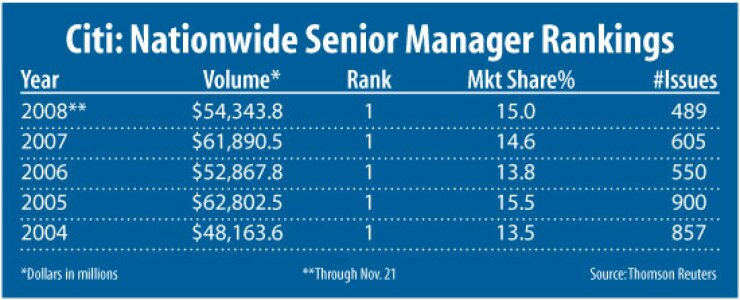
WASHINGTON - Municipal market participants yesterday hailed Sunday's dramatic rescue of Citigroup Global Markets Inc. by federal regulators, and said they hope it will stem lingering concerns about the banking giant's broker-dealer arm, the muni market's top-ranked underwriter.
The financial assistance came on the heels of significant layoffs at the firm, including roughly a third of the firm's tax-exempt group.
Despite the radical intervention, in which the government agreed to guarantee about $306 billion in loans and securities while also directly investing about $20 billion in Citigroup, some market participants said that it was unclear if additional federal assistance for the firm will be needed.
The government rescue does not mean Citi's troubles are over, said Matt Fabian, managing director at Municipal Market Advisors. Issuers and investors should evaluate their portfolios for exposure to Citi and "continue to assume the worst is possible," he said.
Meanwhile, top congressional lawmakers, who said the federal assistance for Citi was probably necessary, nevertheless criticized Treasury secretary Henry Paulson for not yet acting to help reduce home foreclosures as Congress intended under the $700 billion Troubled Asset Relief Program.
Though Congress authorized Treasury to purchase "troubled" assets off the books of financial institutions and to help to stem foreclosures, Paulson has said that he has no plans to do either and instead will use the $700 billion to inject capital into financial institutions.
"The decision by [Paulson] to use TARP funds for Citigroup underlines the contrast between the administration's activity in this area and its failure to take similarly decisive action to reduce mortgage foreclosures," House Financial Services Committee chairman Barney Frank, D-Mass., said in a statement. Frank noted that "tens of billions" of the initial $350 billion of TARP funds remain available "for immediate use to reduce foreclosures even before drawing on the second $350 billion."
Senate Banking Committee chairman Christopher Dodd, D-Conn., was more reserved, saying only that "significant steps" should be taken to stabilize the financial markets "and get credit flowing again" and that he will review the details of the federal assistance to Citi.
Aiming to assure investors, President Bush stressed yesterday that the federal government will act as needed to prevent other large banks from failing.
"We have made these kind of decisions in the past, made one last night, and if need be we're going to make these kind of decisions to safeguard our financial system in the future," Bush said, joining Paulson, and speaking to reporters outside the main Treasury building here.
Several muni market participants said they are hopeful that the rescue plan unveiled late Sunday will work.
"It's a big sigh of relief," said one financial advisor who works closely with Citi, the bank's broker-dealer unit. "Citigroup was in danger last week, and this takes them out of play" from immediate harm.
Citi's government deal gives the company upfront cash and protection from losses on its loan and asset-backed securities portfolios.
Treasury and the Federal Deposit Insurance Corp. will guarantee against large losses on an asset pool of about $306 billion of loans and securities backed by residential and commercial real estate and other similar assets, which will remain on Citi's balance sheet.
The plan partially caps Citi's losses at $29 billion on the loan and asset-backed securities portfolios. Citi will be responsible for 10% of its losses that exceed $29 billion and Treasury and the FDIC will pay 90% of additional losses. Treasury also will provide $5 billion from TARP for a potential second round of losses and the FDIC will provide $10 billion for a third round of losses. The Federal Reserve agreed to assume any additional losses.
Meanwhile, Treasury will provide an additional $20 billion to Citi from TARP on top of the $25 billion the company received in October. In exchange, Citi will issue to Treasury $20 billion of non-voting preferred shares that will pay an 8% dividend annually.
The company is required to slash its dividend to one cent for three years and submit to the government a plan for restrained executive compensation.
The bailout comes after Citi laid off about 70 of its muni bond professionals last week as part of a broader restructuring meant to lower the bank's overall number of employees by about 20% to 300,000. Sources have said that Citi's municipal group employed about 400 professionals, including 140 bankers.
Nearly all of the biggest banks have trimmed their municipal staffs amid broader, company-wide layoffs in recent months. Goldman Sachs Group Inc., for instance, recently laid off at least 30 municipal professionals after announcing plans to cut 10% of its entire workforce.
Job losses have also resulted from consolidation of firms, such as JPMorgan's acquisition of Bear Stearns & Co., and from contraction, such as UBS Securities LLC decision to close its public finance department earlier this year.
In September 1997, Travelers acquired Salomon Inc. and merged it with its own investment arm to create Salomon Smith Barney. In April 1998, Travelers Group merged with Citicorp and in 2003 Citigroup dropped the Salomon name.
Yvette Shields and Jack Herman contributed to this story.





